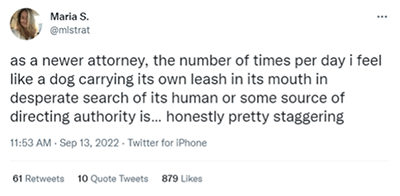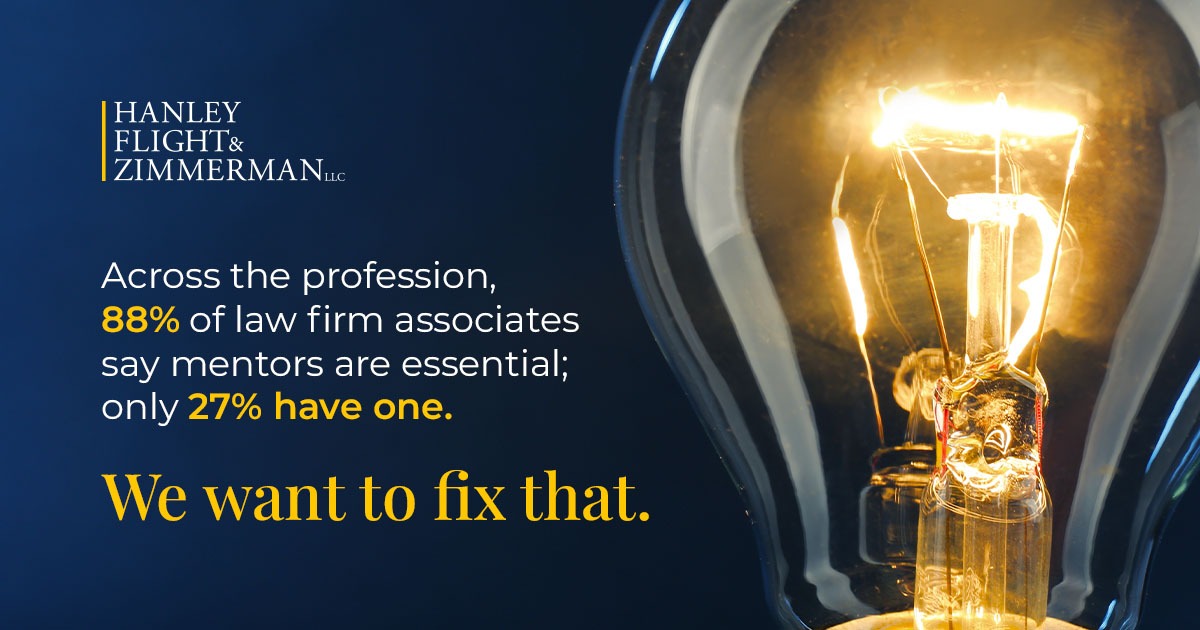When it comes to the traditional law firm onboarding process, one recent tweet sums up a far too common scenario:

As evidenced by nearly 1,000 likes, the author describes a feeling of loneliness and confusion that is familiar to many. Indeed, the American Bar Association shared one survey in which 88 percent of associates said the right mentor was essential for career development….but only 27 percent said one was available to them.
Lack of mentorships is one problem; the success of mentorships is another. In a survey by Major, Lindsey & Africa, less than one-third – 29 percent – of associate lawyers said mentors made a significant difference.
Looking to address both of these concerns, Chicago’s Hanley Flight & Zimmerman (HFZ) created a mentorship program designed to build quality relationships and provide real-time feedback, both quantitative and qualitative, to help new lawyers and patent engineers make the most of their first year in practice.
The fundamentals of the program:
- Every new hire is assigned a mentor. Mentors are HFZ’s capital members, experienced lawyers or experienced patent agents.
- Mentors and mentees meet frequently. This frequency means that if a problem does surface, it is addressed early – and the practitioner has sufficient time to course-correct.
- Once a month, mentors review the mentees’ key performance indicators (KPIs), reports that show quantitative measures such as efficiency, on-time delivery and billable hours.
- Mentors also share qualitative feedback. Through the firm intranet, HFZ colleagues can share praise or advice on an ongoing basis; this is collected by the mentors and shared with the mentees monthly as well.
“Together, the KPIs and the feedback drive their conversations so they talk about things that matter,” said Founding Member Mark Zimmerman. “Here’s how you are performing on paper, and here’s what people are saying.”
In addition to providing meaningful structure to the mentor-mentee meetings, Zimmerman said the format prevents any shocking revelations at year-end evaluations.
“It makes the end-of-year review like getting a report card,” he said. “You know the grades you have earned throughout the class. There are no surprises.”
It’s a vastly different approach to what he and the other firm founders endured as associates, Zimmerman said.
“We didn’t receive hours reports, we didn’t receive efficiency reports, and no one was assigned to us,” he said. “Some people had the mentors they needed, but some didn’t.”
By creating formal mentor-mentee pairs – and providing them a helpful structure – the HFZ program has proven to benefit more than just the new hires.
“It helps the mentors remember what it was like to be at that stage, to remember the demands on these people, and to adjust expectations,” he said. “It also benefits the entire firm to have people truly invested in these people’s success – it makes a more pleasant sandbox.”
Over the long run, it helps clients too, he said: “Any time we have people with the firm doing the work in a way that delivers consistency and quality, it benefits our clients.”

